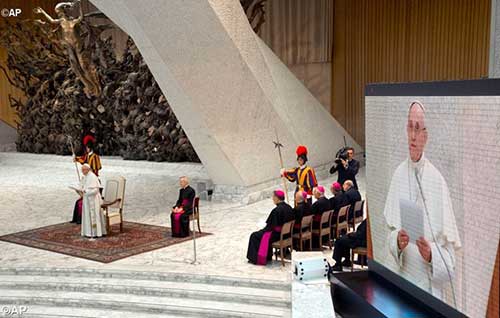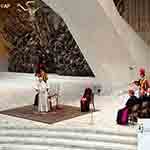
After this teaching, after this long path we can affirm with certainty and magisterial authority that the liturgical reform is irreversible. Pope Francis to the 68th Italian National Liturgical Week.
In Pope Francis’ message to the Liturgical Week, the Pope noted that reform of the books was one thing, renewing the church is related: “it is not sufficient to reform liturgical books to renew the mentality.”
And this is happening beyond the Roman Catholic Church:
Finally, we cannot forget hat the wealth of the Church in prayer, inasmuch as she is “catholic”, goes beyond the Roman Rite which, although the most extensive, is not the only one. The harmony of traditional rituals, of East and West, by the breath of the same Spirit gives a voice to the single prayerful Church, for Christ, with Christ and in Christ, to the glory of the Father and for the salvation of the world.
There seem, to me, to be two directions to be reactionary to the Spirit’s renewal in worship: (1) is to abandon the often-laborious renewal and revert to the pre-Vatican II models, be they Latin, Elizabethan English, or the equivalent (and this movement can include presiding ad orientem, praying in a low voice, with the faithful as “strangers or silent spectators”, and so on), and (2) is to abandon the often-laborious renewal (and with it the inherited liturgical life traceable through the Church’s history to the Synagogue and earlier) and create a worship life ex nihilo, de novo (with no robes, lectionary, symbolic life,…and this movement can also include the sense of concert with the faithful as “strangers or silent spectators”). The Pope is urging that we do not give in to either extreme.
Pope Francis models the worship life he is advocating: where worship is a means to union with God in Christ.
The liturgy is life for the entire people of the Church.[13] By its nature the liturgy is indeed “popular” and not clerical, being . as the etymology teaches us – an action for the people, but also of the people. As many liturgical prayers remind us, it is the action that God Himself performs in favour of His people, but also the action of the people who listen to God Who speaks and who react by praising Him and invoking Him, welcoming the inexorable source of life and mercy that flows from the holy signs. The Church in prayer brings together all those whose heart listens to the Gospel, without discarding anyone: small and large, rich and poor, young and elderly, healthy and sick, righteous and sinners. To the image of the “immense multitude” that celebrates the liturgy in the shrine of heaven (cf. Ap. 7: 9), the liturgical assembly overcomes, in Christ, every boundary of age, race, language and nation. The popular reach of the liturgy reminds us that it is inclusive and not exclusive, an advocate of communion with all but without homologating, as it calls to each one, with his or her vocation and originality, to contribute in edifying the body of Christ. The Eucharist is not a sacrament “for me”, it is the sacrament of many who form a single body, the holy faithful people of God.
The Pope leaves us, certainly my church, with a strong challenge: “the liturgical education of Pastors and faithful is a challenge that must always be faced anew.”
If you appreciated this post, do remember to like the liturgy facebook page, use the RSS feed, and sign up for a not-very-often email, …




I wonder if we could get +++Francis out to the next ministry educator’s training day?
I’ll put a donation towards the flight, Peter, or welcome him to stay at our place. Ps. I would be very surprised if Francis himself would use three +s. Blessings.
I know but I need to keep all the Archbishop Francises in their place 🙂
I think that the traditionalist response to Pope Francis’ comments has been excessive. However, I wonder about your statement that it is self evidently ‘reactionary’ and against the Spirit to appeal to older models, be they the Tridentine Rite or the 1662 BCP. (Incidentally, I’m also unsure that contemporary worship services are ever ex nihilo, de novo)
I agree that a wholesale return to those older forms would be both undesirable and impossible, but it seems to me odd to suggest that the Spirit isn’t present in the cross-denominational recovery of more traditional services and postures within the liturgical ecosystem.
One problem here is the phrase ‘strangers or silent spectators.’ Often accurate for the experience of pre-conciliar liturgy, it has come to distort the nature of participation, and imply that ‘active participation’ can be measured by ‘saying more things’ or standing up and sitting down. This misunderstands the nature of liturgical prayer, and leads the the assumption that, say, the ad orientem posture when used in modern rites is necessarily ‘reactionary against the Spirit.’
In my experience, badly done liturgy versus populum, particularly when the aesthetics of the vestments and the music seem very much stuck in the 1970s has just as much potential to be dry and reactionary as the worst of pre-conciliar liturgy. My childhood RC parish is a case in point.
Perhaps my point is mostly that the Spirit is present in renewal, and renewal can also be the recovery of older forms within the contemporary context, in which they signify differently. The contemporary recovery of traditional forms has been made possible by the Council, and it seems reactionary in itself to dismiss this, particularly when EF Masses, BCP Mass and Evensong, and more traditionally-styled contemporary liturgies seem to be attracting demographics who wouldn’t attend your average contemporary Sunday service.
Apologies if I’ve misunderstood your meaning – I find the interaction between old and new fascinating as someone who taught Theatre Studies at University level. Similar debates about the nature of participation and spectatorship abound!
Thanks for this comment. Before proceeding, on this site, please use your ordinary name – thanks.
Yes – I suspect we may be talking past each other. I think we should leap over the ad orientem/versus populum debate straight to in circuitu altaris. I certainly agree with you, if I hear you correctly, that adding more words for people to say isn’t increasing participation. I would move in the direction of simplification and shared silence. Nor do I see any issue with “the recovery of older forms within the contemporary context” – surely that is essential to good liturgy? I don’t really know what you mean by “the cross-denominational recovery of more traditional services and postures within the liturgical ecosystem”, so I’m certainly confused whom you think “suggests that the Spirit isn’t present” there. Blessings.
Happy to use my real name – only used my twitter handle so you could see the link.
You said that being ‘reactionary the the Spirit’s renewal’ included ‘Latin, Elizabethan English…ad orientem, praying in a low voice.’ I read this, possibly wrongly, as saying that such practices are in opposition to the work the Spirit wants to do in the liturgy.
My experience is that, in both the RCC and CofE, such practices are actually drawing people in, often because they provide the space for shared silence you speak of. So I don’t think that the things you list as ‘reactionary’ are necessarily so, but I recognise that they can be.
Thanks, Chris. I think you are clarifying my position well. I think that celebrating in circuitu altaris is of the Spirit, as is increased simplicity and shared silence (as just examples of liturgical renewal). I know those who preside ad orientem (to stay with this point – say, from time to time, for a particular context) who are not doing this as a protest against the contemporary majority. There are others who, in doing so, deprecate the in circuitu altaris majority. The reference in my post would be to the latter rather than the former. I was, in my post, trying to present a spectrum – with one end denying the liturgical spirituality evidenced by Vatican II by reverting to the earlier patterns, and at the other end simply replicating contemporary non-church culture. To your other point about numbers: that also needs to be treated with caution. I think the church (in my experience) needs to be more realistic and honest about shrinking numbers; on the other hand we need to be principle rather than number-driven. Blessings.